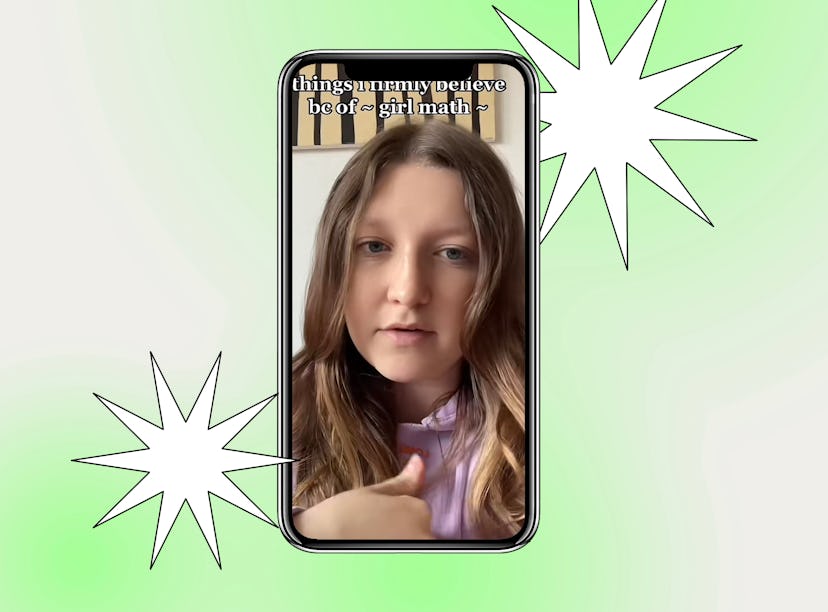
What Is Girl Math On TikTok? Time To Justify Your Spending Habits
I basically made money going to Taylor Swift’s Eras Tour.
This may be a girl’s girl summer, but buying tickets for Taylor Swift’s Eras Tour, dressing up for Beyoncé’s Renaissance Tour, and going to see the Barbie movie isn’t cheap. This is when every girl’s girl needs a bit of girl math. While scrolling through your FYP, you may have come across someone talking about this TikTok concept. Those who get it, get it, but those who don’t may be wondering what girl math means, and how you can use the logic yourself.
Girl math is essentially a way for people to justify making extravagant purchases. Instead of just looking at the price tag and your budget, you look at the whole picture of what could be and what has happened so far. You factor in all the different scenarios surrounding what you plan to purchase, like how many times will you use it? Is it on sale? How much was it originally? What form of payment are you going to use? How much will it cost later versus right now? After evaluating all the possibilities, you can determine, with girl math, whether you’ll actually make a profit off of this purchase in the end.
The term picked up on TikTok thanks to a radio show in New Zealand, ZM’s Fletch, Vaughan & Hayley, which discussed using girl math to explain why a caller, Andrea, would actually be making money by spending $400 on hair extensions for her wedding. Dividing the total cost of the salon visit by each of the wefts it would take and the inches of hair, they calculated that the extensions would only cost about $1.40 per inch. When you break it down that way, it doesn’t seem so expensive. Plus, they reasoned that if she didn’t get her hair done for her wedding day, she would regret it down the road and want to redo everything to get new photos. This would then cost an additional $40,000, so Andrea would actually be making money by getting the extensions the first time.
Girl Math On TikTok, Explained
Along with going through each purchase to justify certain expenses, there is other logic that comes into play with girl math. TikToker @mckennaelianna shares some of these theories she “firmly” believes in, such as the idea that any purchase made with a gift card or money already in your Venmo account is “free.” That includes anything you buy under $5 or with cash you found in your purse. You can also make money with girl math by returning an item you purchased, or buying something at least 50% off. If you wanted to get something expensive but didn’t, that’s a profit as well.
Sometimes, a big purchase for travel or a experience can be free if you spend your money on it ahead of time. For example, if you bought tickets to the Eras Tour back in November, you’re not spending that money the day of the concert — so, it’s free. Any travel you paid for already to get to the Eras Tour doesn’t count once the concert rolls around, either. As TikToker @samjamessssss says, “If you pay for trips in advance, by the time you go on the trip, it’s free.”
You can also “make” money from experiences like the Eras Tour in different ways. One way is to factor in different prices. Buying last-minute tickets can be expensive, but if you check StubHub to see seats in your section being resold for a higher price than what you spent, that means you’re making money by going. This is because you could theoretically sell your tickets for that price and make a profit. It’s girl math. Also, any outfit you wear made of clothes you already have in your closet is a profit, because you’re saving that money you would have spent — girl math!
While it’s funny to use girl math to justify your spending habits, the logic is actually pretty good in some cases. For instance, Fletch, Vaughan and Hayley also discussed on their show that if someone buys a $330 dress, it costs less every time you wear it. If you plan on wearing something multiple times, the “cost per wear” really does make the purchase reasonable. Their guest, economics expert Brad Olsen, even said he liked the idea of girl math and “thinking like an economist” to get the “most bang for your buck.”
So, if you’ve spent a lot of money on your glitter-filled girl’s girl summer, just look at everything you paid for and how that has actually benefitted you in some way. You may just be riding high on a girl math surplus and not even know it.
This article was originally published on